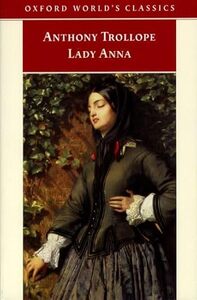
In his Autobiography Trollope declared “Lady Anna is the best novel I ever wrote! Very much! Quite far away above all others!!!” Unfortunately, the reading public did not agree and Trollope was forced to defend his heroine on many an occasion.
Much of the narrative in this 1874 novel is focused on the eponymous Lady Anna’s mother, Countess Lovel. She was the penniless Josephine Murray who impetuously agreed to marry the dissipated Earl Lovel for his money and status. After the birth of Anna, he casts them both aside, revealing that he already has a wife living in Italy. Shortly afterwards he dies, thereby creating much work for the lawyers. The Countess embarks upon an indefatigable quest to restore her daughter’s good name and fortune. In the meantime, they are supported by the kindly local tailor, Thomas Thwaite, who uncomplainingly spends his life savings on keeping them in comfort. The young Anna falls in love with his son, Daniel, a journeyman tailor and inveterate Radical, but the Countess is determined that she should instead marry her cousin, the heir to her father’s estate.
The main plot of the novel concerns the intense struggle between a mother’s determination to put family interests first and a daughter’s right to choose probity over expedience. The Countess married without love in order to improve her social status and she expects her daughter to do the same. Her ruthlessness makes her a much more interesting character than Lady Anna. Trollope uses her to demonstrate powerfully how parental “unconditional” love is actually predicated on the child meeting certain expectations. The happiness she craves for her daughter is actually her own happiness. For Lady Anna, however, it is a straightforward moral dilemma: should she obey her mother and extended family, or stay true to the man she promised to marry?
Unusually for Trollope there is a great deal of dramatic tension, which reaches a sensational (if understated) crescendo. The introduction refers to the outcome as a “foregone conclusion”, but I must confess to having been unsure until the last few pages (I shan’t spoil it). The mere suggestion that an heiress would marry a tailor upset both reviewers and readers, and the partially sympathetic portrait of Radicals was also received unfavourably. The Saturday Review lamented the “disruptions of social order”. Trollope does, however, mischievously point out the irony of Daniel Thwaite angrily demanding equality, but then insisting that a wife’s wealth should belong to her husband. Mind you, this is not to suggest any proto-feminist agenda on Trollope’s part. He adopts his customary ambivalent position, feeling uncomfortable with the circumscribed existence led by his heroine, but also fearful as to the consequences of her being granted more latitude.
Although he shows a young woman rebelling against familial authority, she is ultimately only choosing the man to whom she will submit. There is no suggestion that Lady Anna could choose be an independently wealthy woman, even though this is entirely possible under the terms of her inheritance. There is no romance in her relationship with Thwaite, and both marital choices are motivated by obligation rather than desire. Lady Anna is a surprising and frustrating novel, not least because the final paragraph promises a never-written sequel. I wouldn’t agree with Trollope that it is his best novel, but it is certainly one of his most intriguing.
Lady Anna by Anthony Trollope